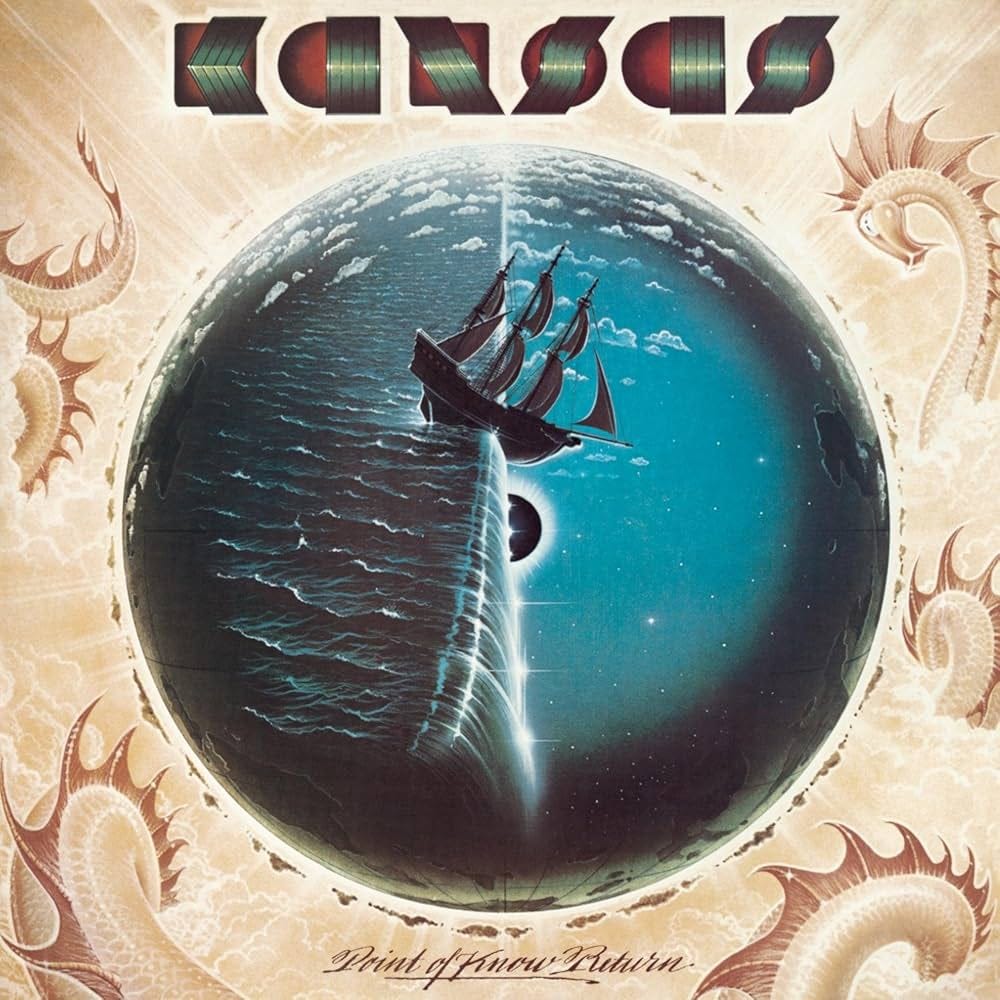Yeah, I know that an album that’s sold 4 million copies in the US alone isn’t truly abandoned, but when was the last time you sat down and listened to Point of No Return? I mean, outside of the title track and “Dust In The Wind”.
Coming off the heels of the multi-platinum Leftoverture, this would be their fifth album in three years. Consider that for a moment: three albums in five years is an impressive output, especially for a band known for its progressive rock tendencies. By way of comparison, contemporaries Genesis released three albums during the same period (four if you count the double album The Lamb Lies Down on Broadway as two) and Yes released two albums.
Just as they had with the previous album, Point of No Return finds the band continuing to grow and fire on all cylinders. This is a record very far from the, at times, bloviating masturbatory world of trad progressive rock. Of the ten songs on PONR, only two clock in at over five minutes; it’s clear that the band had found a more compact voice.
The taut and self-referential “Point of No Return” is a standout track. In hindsight, it could be seen almost as an allegory for the band’s career. Interestingly, even though the band continued for years afterward, a documentary about the band Kansas: Miracles Out of Nowhere conspicuously stops after PONR.
All three songs chosen as singles, “Point of No Return”, “Dust in the Wind”, and “Portrait (He Knew)”, are the standout tracks. They harken back to a different era in music, one where singles got chosen by gut instinct, merit, and, given the era, maybe a fair amount of cocaine, rather than based on marketing PowerPoint presentations and ones and zeros.
Is “Point of No Return” the greatest Side 1, Track 1 song ever? Aside from being obvious (as Jack Black notes in the film High Fidelity), I’m sure we all have an opinion on this one, but you gotta admit, it’s pretty good.
“Dust in the Wind” is the track we all know. Like other great riffs (I’m looking at you, Joe Walsh), this one began as a finger exercise for songwriter Kerry Livgren, who wanted to learn fingerpicking. It was at his wife’s urging that he brought it to the band. And the rest is history.
Given Livgren’s spirituality, it’s a safe bet that “Dust in the Wind” has its origins rooted in some religious setting. It could be:
“A meditation on mortality and the inevitability of death, the lyrical theme bears a striking resemblance to the biblical passages Genesis 3:19 ("...for dust thou art, and unto dust shalt thou return.") and Ecclesiastes 3:20 ("All go to one place. All are from the dust, and to dust all return.").”
The third single, “Portrait (He Knew),” was about Albert Einstein. Lyricist Kerry Livgren is said to have written the lyrics while undergoing a conversion to Christianity.
While the version on the record is indeed about Einstein, it’s not much of a stretch to see religiosity in it. So much so that Livgren later re-recorded the song with his Christian rock band and changed the lyrics to be about Jesus. I can’t profess to have heard that version, but the version about Einstein is an album highlight.
Make no mistake, PONR, while perhaps not traditional prog rock, the record is prog adjacent. The instrumental “The Spider,” penned by lead singer and keyboard player Steve Walsh, is a track that you’ll thank for its brevity, although it does serve as a quirky segue into “Portrait (He Knew)”.
Side two is where Kansas stretches their prog muscles—sometimes effectively, sometimes indulgently. Some of the songs seem longer than their run time. Clocking in at over seven minutes, the album’s closer, the Livgren-written “Hopelessly Human,” could test your patience.
I won’t profess to be a huge fan of prog-rock, or even art rock, and I have a hard time ascribing either label to the band. For my money, they’re simply a rock band, albeit one that is prog-adjacent. Considering the radio-friendly length of the tracks, it may be that they were aiming for that terrain.
For all the prog comparisons to Yes or Genesis, Kansas always felt different. They were Midwestern rockers who happened to lean arty, not lofty British stars. Robert Christgau dismissed them as “dumber, slower, and fatally unconvincing,” but that misses the point.
Point of No Return might live in Leftoverture’s sales shadow, but it’s Kansas at their sharpest - ambitious, most accessible, and undeniably Midwestern. Proof that prog rock could be radio-friendly without losing its soul.




Wow I listened to them when I was in junior high when they were hip.